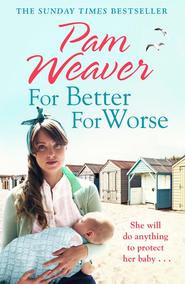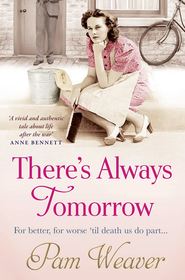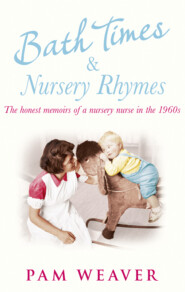По всем вопросам обращайтесь на: info@litportal.ru
(©) 2003-2025.
✖
Pack Up Your Troubles
Автор
Год написания книги
2018
Настройки чтения
Размер шрифта
Высота строк
Поля
Her mother looked a little surprised too. ‘I suppose it’s years of saying, “Oh … put it in the attic for now”,’ she smiled. ‘What are you looking for anyway?’
‘My old school books,’ said Connie. ‘I’m teaching Kez to read.’
‘Try that box over there,’ said her mother.
The first of the boxes contained an old photograph album. Connie flicked through and smiled. The box Brownie had recorded so many happy occasions but it was a shock to see her father’s face again. Out of respect for her new husband, her mother had moved his pictures up here when Clifford came into the family. She turned a page and there was Kenneth. Her heart missed a beat and she sighed inwardly. He looked about twelve. He was bare-chested and wearing short trousers. His fair hair was tousled and he had obviously been looking for something in the pond. He was proudly holding up a jam jar tied with a string handle and something lurked in the water. She stared at her long lost brother and wished he was here. Memory is selective, she knew that. She’d forgotten the times when they had been at loggerheads, or the times when he’d thumped her for getting in his way. All she could recall were the picnics on the hill and her mother reading them endless stories, or fun and laughter at the beach and being pushed on the swings until she was so high it was scary. She ran her finger over Kenneth’s face and slipping the photograph from its stuck-down corners, she palmed it secretly into her pocket.
Her mother was rummaging through a different box. ‘These are all books,’ she said.
Putting the album down, Connie went to join her. Her mother had found an old school book but it looked very babyish. Connie didn’t want to embarrass Kez because she knew that she wouldn’t bother to practise if the book looked like it was for a child. In the end she chose two of her own books to take. Grace Darling’s Tales, a book she had been given by an aunt when she was about nine. It had two girls in swimsuits on the front cover. They were standing on the rocks with their dog. It was a bit more advanced than Connie would have liked but it was a start. The other book was her all-time favourite when she’d been a girl. She’d bought the Stories from the Arabian Nights for thruppence in a jumble sale. Connie knew she would enjoy hearing the stories again; The Porter and Ladies of Baghdad, Caliph the Fisherman and Ali Baba, who adorned the front cover. She’d always loved the romantic illustrations of the men in their flowing robes and dark smouldering looks. Now she and Kez could begin her long uphill journey to literacy.
As they pushed the box back against the wall, it was hindered by something underneath. Connie bent down and picked up a stuffed giraffe, Kenneth’s toy from when he was a baby. It was in a sorry state now, lopsided and some of the stuffing had come out of one foot. The two women stared at it in silence.
‘Do you ever think of him, Mum?’ Connie asked quietly.
Gwen straightened her back. ‘He is my son,’ she said simply. ‘There isn’t a day goes by when I don’t think about him.’
Connie could feel the tears picking at her eyes. She pushed the box right back and stuffed the giraffe down the side. That’s when she spotted her old doll’s pram. ‘Oh, look! I bet Mandy would like to play with that,’ she said deliberately changing the subject. She raised the hood and fingered the holes along the crease.
‘It could do with a bit of repair,’ said Gwen uncertainly.
‘And I know just the man,’ smiled Connie. ‘Don’t say anything and we’ll get it done for Christmas.’
Armed with her books, Connie made for the stairs. Her mother hesitated. ‘You don’t know why Kenneth left like that, do you?’
Connie froze. Her face flamed. She dared not look back or her mother would have seen. ‘Haven’t a clue,’ she said brightly as she ran down the stairs.
The nurse pulled the curtain around his bed and leaned over to undo the buttons on his pyjama top. Kenneth didn’t look down. He didn’t want to see the livid redness, the uneven skin and the scars. He’d looked at himself in the mirror once and it had turned his stomach. His own body and he couldn’t stand to look at it. They had done what they could and the ice packs on his hand relieved the awful pain. Hands. That was a joke. He didn’t have hands anymore. One of them was little more than a shapeless stump.
The doctor and his entourage swept in, each pulling the curtain closed until they were all cocooned together. Now there were six of them standing around his bed. Six and the nurse. Nobody spoke. He looked at each man in turn. He knew what they were thinking. Poor sod. Got right through the war unscathed and then, while the rest of the world is dancing in the streets, he comes down in flames to this … He thought of some of those who didn’t make it. Pongo Harris and Woody Slade and little Jimmy. At least they’d gone out intact. He might be still alive, but look at the state he was in. It would have been better if he’d died along with the rest of his crew.
The doctor leaned towards him. ‘I’m putting you up for transfer, Dickie,’ he said.
Kenneth snorted and turned away. That’s right, he thought. Out of sight, out of mind. Not my problem.
‘Listen, son,’ said the doctor. ‘We’ve done all we can for you here, but there’s a place where they are brilliant at helping boys in your position. It’s in East Grinstead, the Royal Victoria Hospital. They’ve got this man there called McIndoe and he’s pioneered some wonderful treatments for burn victims.’
‘The chaps who’ve been there are proud of what they’ve achieved. They called themselves The Guinea Pig Club,’ said one of the others.
Kenneth closed his eyes in disgust. ‘I’m not going somewhere to be experimented on. Just give me a gun and I’ll finish the job for good.’
‘That’s enough of that kind of talk,’ the doctor snapped. ‘Look,’ he added softening his tone, ‘what if I get someone to come and see you? Maybe even the big man himself. It’s up to you, but surely it’s worth a try.’
Kenneth sighed. He didn’t want this but they’d keep on and on until they had their way and he was too tired to argue. ‘All right,’ he said wearily.
‘Good man.’ The doctor leaned towards him again. ‘You know, it’s time you thought about contacting your loved ones.’
His patient’s eyes blazed. ‘No, absolutely not. I’m not ready for all that.’
Connie kept herself busy for the rest of the day and did her best to avoid working with her mother. After tea, Connie worked in the shop with Sally. They usually had a bit of a laugh together but Sally wasn’t her usual chatty self which suited Connie for now. Her mind was filled with thoughts of Kenneth. If all went to plan, she would join Kez in the evening and begin her lessons. Perhaps she should talk to Kez about Kenneth, and yet even as the thought crossed her mind she knew she wouldn’t. It was embarrassing and shameful and she couldn’t bear the thought of Kez knowing such awful things about her. She had struggled for years to put it all behind her, but what with Ga and her constant reminders and the fact that her brother was estranged from the family, what hope had she? At least by keeping busy, she wasn’t thinking about having to lie to her mother. How she wished she could just up sticks and go for her training. Being a nurse seemed to be so right for her but by being stuck here in the nursery, she’d probably end up like Ga, an old maid with nobody to love. Life was bloody unfair sometimes.
Five
It didn’t take long for Saturday evenings at the dance hall to become a routine. Connie joined up with Jane Jackson, Sally Burndell and a couple of other girls to go to the Assembly Hall in Worthing. Their dresses were all homemade. There was so little material to be had but Connie was good with a needle. She was wearing a pretty blue and white dress with a full skirt and a scooped neck with a trail of white muslin draped attractively across the shoulders. She’d found the material in another form in a jumble sale. The dress was far too big so she was able to take it to pieces and start again.
The dance was up some steps in the next road to the New Town Hall. The place was packed although as time went by, there were fewer men in uniform. Demob suits were very much in evidence. The Assembly Hall was a beautiful building. They entered a large foyer, bought their tickets and went to the cloakroom to hang up their coats. Connie loved the Art Deco reliefs, the star-shaped light fittings and the proscenium arch which was flanked by seahorses. It spoke of an age long since gone and yet somehow the building seemed as fresh and exciting as it must have done when it was built in the 1930s.
The band was already playing as they walked in and a small glass orb glittered from the ceiling. Connie and her friends found a table and sat down. The dances were done in threes. It might be a foxtrot or a rumba or a waltz when the lights were dimmed right down. As the band struck up, the men circled the seated area looking for a partner. Jane was always popular but Connie and Sally had to wait a little while before someone asked them to dance.
It had taken Connie a while before she’d got to know the other girls. At sixteen, Sally’s secretarial course was due to start towards the end of September. She may have been a lot younger than the rest of them, but she fitted into the group well. Jane was the joker. Having heard of Sally’s ambition to be a private secretary rather than ending up in the typing pool, Connie had asked Jane about her ambitions. Jane had looked thoughtful and then said, ‘I think I’ll marry a man with one foot in the grave and the other on a banana skin,’ and they’d all laughed.
‘How’s your boyfriend in the army?’ said Connie making small talk while they waited.
Sally had just refused to dance with a tall, lanky man with buck teeth. ‘Terry? Fine,’ she nodded. She picked up her handbag and rummaged inside. ‘He’s still in Germany. He says he’ll be stuck there until he’s demobbed next year.’
‘What rotten luck,’ said Connie. ‘A year is a long time.’
‘I’ll wait for him,’ said Sally, pulling out a dog-eared photograph. ‘That’s my Terry.’ He looked about twenty and was tall with round-rimmed glasses.
‘He doesn’t mind you coming to dances?’
‘Well, he can’t expect me to live like a hermit,’ Sally retorted, ‘but I shall always be faithful to him.’
A good looking man with slicked-down hair came up to the table and gave the girls a short bow. ‘May I?’
‘And what the eye doesn’t see …’ said Sally, taking his hand.
Connie went back to the gypsy camp whenever she had a spare minute. Kez was a willing pupil even though some of her relatives teased her when they saw what she was doing. She had been right about the books. Kez had loved the Stories from the Arabian Nights and who could blame her. All those handsome, dark-eyed men fighting for the women they loved and looking at the girls in their pretty Eastern dress made enjoyable reading.
‘The way you two sit like that,’ Reuben remarked one day, ‘you could be sisters.’
Connie smiled. She would have liked to have had a sister like Kez. Simeon was a nice man too. He sat close to his wife and a couple of times, as Connie traced the words with her finger on the page, she caught him mouthing the words along with her. So he was illiterate too? Connie was amazed. He had created a real work of art in wood on the outside of the trailer. He clearly had a good eye because the few times she had watched him at work, she’d noticed that he didn’t have a pattern to follow. It was all in his head. Eventually Connie plucked up enough courage to ask him about the pram.
‘Bring it with you next time,’ Simeon smiled, ‘and I’ll see what I can do.’
People labelled gypsies as stupid but Kez and her family were far from that. They may have lacked formal education but their skills and knowledge in other areas were second to none. Isaac was always turning up with a river fish or a couple of rabbits, and at one time a couple of pigeons for their supper. Kez invited Connie to stay but most times she declined, preferring to be home in time to read Mandy a bedtime story.
When Connie got back home on 24 July, her mother and Ga were glued to the radio. At the beginning of the month the whole country had been full of election fever. Most people thought it a foregone conclusion that Mr Churchill would get back into Downing Street but there was also a groundswell of opinion that the country couldn’t go back to the old ways. It was time for radical change. All the same it came as an enormous shock when the final count was declared after the overseas votes had been collected by RAF Transport Command. The Labour Party headed by a rather weedy looking man called Clement Attlee had won a landslide victory.
‘God help us all,’ Ga said darkly as she turned the radio off. ‘It’s going to be just like Churchill said. We beat the Gestapo in Germany and now they’ll come here, you mark my words.’
‘I’m sure it won’t be that bad, Ga,’ said Gwen good-naturedly.
‘And you can hardly blame us for wanting change,’ said Connie tartly. ‘Look what’s on offer, full employment and a free health service.’
‘Stuff and nonsense,’ Ga retorted. ‘Anyone with half a brain could see that’s all rhetoric and empty promises. A welfare state from the cradle to the grave? It’ll never happen in my lifetime.’
It had taken a bit longer than they’d thought but Clifford came home with the minimum of fuss. Connie and her mother were anxious about him because they had no idea what kind of state he might be in. Immediately after the war, the newsreels at the pictures showed some harrowing sights coming out of Germany. Whole cities flattened by Allied bombing, women and children picking their way through the ruins and of course the opening up of those terrible concentration camps. It was a lot to take in and it must have been even worse for those who saw it at first hand. Joan Hill from the village found a wreck of a man waiting on the platform when her Charlie came home and he still wasn’t right in the head.









